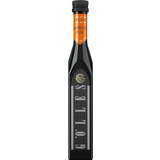Apricots from Wachau - The Sweet Power Fruit from Austria
Apricots are fruits that pack quite a punch! The Wachau region in Austria produces a high yield of apricots every year and has incidentally also developed into a tourist magnet in the past decades. Find out what makes this fruit so special and what it is used for!
The power of the apricot
Apricots can be processed in a wide variety of ways. They are very popular in culinary terms because of their delicious taste and they are often used in cosmetics because of their excellent skincare properties. As an ingredient in creams, peeling products or in the form of pure oil, apricot kernel oil is often used in anti-ageing products due to its regenerating effect.
Apricots also have many nutrients beneficial to our health such as:
Provitamin A
- regulates the growth of cells
- plays an important role in eyesight
- ensures a strong immune system
- strengthens the bone structure
Vitamin B1 and B2
- especially important for energy metabolism
- play an important role in the nervous system
Vitamin C
- strengthens the immune system
- important for the development of connective tissue
- promotes wound healing
Minerals such as
- Potassium
- Calcium
- Phosphorus
This is how apricots affect the body:
- help digestion
- strengthen nerves
- help drain water from the body
- offer a lot of vitamin A
- boost the immune system
- protect the cells
Facts about the apricot
The apricot belongs to the rose family and is also assigned to the stone fruit family. Apricot trees need a lot of sun and tolerate drought well. They are very sensitive to spring frost during the flowering period and rain at harvest time.
In Austria, apricot cultivation occurs mainly in Lower Austria (Wachau & Weinviertel regions), Burgenland and Styria.
The Wachau apricot
The Wachau apricot is the best known in Austria because the climatic conditions and the soil in the Wachau region are ideal for growing apricots.
The Wachau apricot is not considered a separate variety but has been given a protected designation of origin (PDO) in the EU. An apricot only gets this designation if it meets strict criteria of origin and this includes around 220 fruit growers.
The original Wachau apricot is known for its juicy-sweet taste, which makes it ideal for processing into a wide variety of dishes.
The flowering period is between mid-March and mid-April, depending on the weather. Apricots should only be harvested when they are fully ripe. In Austria this is usually the case from mid-July to early August. You can tell whether the apricot is ripe when the stone can be removed from the pulp very easily.
Other apricot varieties:
- Alexandrian black apricot
- Old pineapple apricot
- Early rose apricot
- Early apricot from Kittsee
- Yellow Wachau apricot
- Large common apricot
From the traditional apricot jam and the popular apricot nectar to unusual culinary delicacies such as apricot vinegar or apricot mustard sauce, at FromAustria we offer a wide selection of culinary and cosmetic products made from apricots. Browse through our wide range of branded products and convince yourself of the power of apricots!
Traditional dishes and products
Austrian cuisine offers many traditional recipes with apricots. You can find some of them in the Wachau cookbook , such as this simple recipe for jam:
A simple recipe for apricot jam
Ingredients:
- 1 kg apricots (without stones)
- 500 g jam sugar 2:1
- 5 g citric acid
Preparation:
Wash, core and puree the apricots. Then stir in the jam sugar and citric acid into the pureed apricots and bring the mixture to the boil while stirring. Let simmer for about 4 minutes. To check whether it is done do the gelling test - put a few drops on a cold plate. If it solidifies, the jam is ready. Pour the hot jam into sterile jars and close tightly. When stored in tightly sealed jars in the dark, apricot jam can be enjoyed for up to 12 months!
Related products
-
 5.0 (1)
5.0 (1)STAUD‘S Finely Strained Apricot - Reduced Sugar, 200 g
- Very high fruit content
- No pieces of fruit in the jam
€ 4,19 (€ 20,95 / kg)Delivery by February 07
-
 4.6 (5)
4.6 (5)STAUD‘S Apricot Jam, Strained, 250 g
- Wonderfully fruity
- No chunky fruit pieces
- Made from the best ingredients
€ 5,09 (€ 20,36 / kg)Delivery by February 07
-
 4.0 (1)
4.0 (1)Gölles Manufaktur Apricot Vinegar, 250 ml
- From freshly picked apricots
- Austrian specialty
- For Far Eastern dishes
€ 8,69 (€ 34,76 / L)Delivery by February 07
-
 4.8 (4)
4.8 (4)Zotter Schokoladen Organic Apricot Waltz, 70 g
- Organic & Fairtrade Certified
- Handcrafted
- Contains alcohol
€ 4,39 (€ 62,71 / kg)Delivery by February 07
Magazine Articles:
-
Austria: Free standard delivery from € 49,90
-
Free
returns -
24-hour shipping
More than 6.100 products


